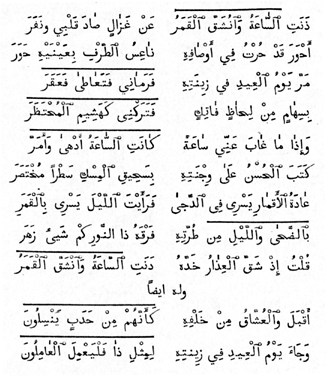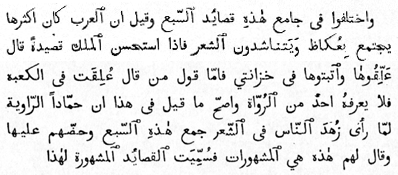It is sometimes said in the East at the present day that Muhammad not only adopted many of the ancient habits and religious rites of the heathen Arabs and incorporated them into Islam, but that he was also guilty of plagiarism in borrowing parts of certain verses of Imrau'l Qais, an ancient Arabic poet. These, it is asserted, may still be found in the Qur'an. I have even heard a story to the effect that one day when Fatimah, Muhammad's daughter, was reciting thc verse 'The Hour has come near and the Moon has split asunder" (Surah LIV., al-Qamar, 1), a daughter of the poet was present and said to her, "That is a verse from one of my father's poems, and your father has stolen it and pretended that he received it from God." This tale is probably false, for Imrau'l Qais died about the year 540 of the Christian era, while Muhammad was not born till A.D. 570, "the year of the Elephant
In a lithographed edition of the Mu'allaqat, which I obtained in Persia, however, I found at the end of the whole volume certain Odes there attributed to Imrau'l Qais, though not recognized as his in any other edition of his poems which I have seen. In these pieces of doubtful authorship I found the verses quoted below

Though they contain some obvious blunders, I think it best to give them without correction. The passages marked with a line above them occur also in the Qur'an (Surah LIV., Al Qamar, 1, 29, 31, 46; Surah XCIII., Ad duha', 1; Surah XXI., Al Anbiya 96; Surah XXXVII., As Saffat, 59), except that in some of the words there is a slight difference, though the meaning is the same. It is clear therefore that there is some connexion between these lines and the similar verses of the Qur'an.
There seems good reason to doubt whether Imrau'l Qais is the author of the lines in question. They may have been borrowed from the Qur'an instead of having been inserted therein from an author who lived before Muhammad's time. On the one hand it is difficult to suppose that at any time after the establishment of Islam any one would have the daring to parody the Qur'an by taking passages from it and applying them to the subject to which these lines of poetry refer. On the other hand, it is very customary even in comparatively modern times to quote verses of the Qur'an and work them into later compositions of a philosophical or religious character, to which class, however, these Odes do not belong. It would be difficult to imagine Muhammad returning to plagiarize from such a well-known author as Imrau'l Qais (even though, as we shall see later; he did so from less known foreign sources); though this may be in part met by supposing that, as these Odes formed no part of the Mu'allaqat, they were not as generally current as poems contained in the latter collection were. Thc account generally given of the Mu'allaqat is that, whenever any one had composed an especially eloquent poem, it was suspended on the wall of the Ka'bah, and that the poems in this celebrated collection owe their name, which means "The Suspended Poems", to this custom. Good authorities,1 however, deny that this was the origin of the name, but that is perhaps a matter of little importance. In spite of the Eastern story which I have quoted, the balance of probability certainly inclines to the supposition that Muhammad was not2 guilty of the daring plagiarism of which he has been accused
Regarding the Mu'allaqat it may be well to quote the following from Abu Ja'far Ahmad ibn Isma'il an nahhas (died A.H. 338) He says:-

As-Suyuti says very much the same, though he also refers to the story that the verses were hung up in the Ka'bah as possible (Mudhkir, II., 240).
2. This is the opinion of Sir C. J. Lyall, than whom it would be difficult to find any one better qualified to speak on the subject of ancient Arabic poetry. In a letter which he has kindly sent me regarding the authorship of the lines in question attributed to Imrau'l Qais, he expresses his conviction that they are not his, giving reasons founded principally upon the style and the metre. I have incorporated some of his observations into this Appendix, and I owe to him also the preceding note. His arguments have caused me to modify the opinion on the subject expressed in my Persian work, Yanabi'u'l Islam









 رد مع اقتباس
رد مع اقتباس

 شكراااااااا
شكراااااااا









المفضلات